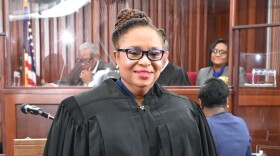ST. THOMAS — Attorneys representing former At-Large Senator Steven Payne Sr. and Governor Albert Bryan Jr. argued their cases before the Supreme Court of the Virgin Islands Tuesday on St. Thomas in two separate lawsuits relating to the expulsion of the former senator from the Legislature and the composition of the board at the Virgin Islands Water and Power Authority.
After hearing the oral arguments, the Supreme Court justices will now deliberate prior to making any ruling in either of the lawsuits.
Payne’s expulsion:
After the 34th Legislature voted during legislative session on July 20, 2022 to approve a resolution expelling Payne for violating four rules of the Legislature relating to the Code of Ethical Conduct to include the body’s zero-tolerance policy against sexual harassment in connection to claims made by one of his staffers at the time, the former senator took the matter to court.
READ MORE: Former-Sen. Payne staffer files civil lawsuit; includes Legislature, Sen. Frett-Gregory in suit
The Supreme Court of the Virgin Islands began hearing oral arguments Tuesday in a civil lawsuit Payne and Noellise Powell initially filed against the Legislature and Senate President Novelle Francis Jr. in the Superior Court that has since been transferred to the Supreme Court.
The lawsuit, filed by attorney Treston Moore, alleges that Payne was wrongfully expelled from the 34th Legislature by rule and without statutory authority. It further alleges that Powell was denied her right as a qualified voter to the candidate she wanted to represent her in the 34th Legislature.
Attorney Joseph Arellano, who represents the Legislature, said the expulsion of Payne was orderly and complied with due process completely. However, the topic of due process ended up taking a backseat at today’s arguments, with the main point of contention being whether the Legislature has the authority to expel a senator in the first place.

Arellano argued it does, citing Section 6(g) of the Revised Organic Act of 1954, which states that the Legislature “be the sole judge of the elections and qualifications of its members” and may exercise “all the authority and attributes, inherent to legislative assemblies.”
This was refuted by Moore, Payne’s attorney, who argued that under the Revised Organic Act there is no enumerated right to expel, and therefore the Legislature has no right to expel its members. Moore said expulsion goes beyond the power of the Revised Organic Act as it does not reconcile the rights of voters to elect their officials. Moore argued that while the Legislature does not have the enumerated right to expel members, it does have the enumerated right to recall members, giving voters the power to remove members from office.

Chief Justice Rhys Hodge sought clarification from Moore.
“Are you saying that the Legislature has no right to expel its members?” Hodge asked.
Moore said the justice was correct in his understanding, adding that the only way out of the Legislature was a recall.
Justice Maria Cabret asked whether Moore saw the language of Section 6(g) to be sufficiently broad to include expulsion, which has historically been seen as an inherent right of the Legislature. Moore agreed that the language was general, but because expulsion was not enumerated, the right to expel members did not belong to the Legislature.
Following this line of questioning, Justice Ive Swan called Moore’s argument “oblivious.” Moore then said that the Legislature was within its rights in sanctioning Payne with a suspension, but that the body’s expulsion of Payne went beyond its power.
In his rebuttal arguments, Arellano echoed Cabret’s earlier statements, saying that the power of expulsion is an inherent power of the Legislature.
WAPA’s board composition:
After the Legislature amended the law on May 4, 2021 to reduce the number of WAPA board members to seven from nine by passing Bill No. 34-0026 (Act No. 8472), it eliminated two out of three members selected from the governor’s Cabinet. The law requires that the sole Cabinet member serving on WAPA’s board must be the director of the Virgin Islands Energy Office.
Bryan subsequently sued WAPA in Superior Court, seeking injunctive relief against implementing Act No. 8472, and requesting declaratory judgment stating the new law violated the Revised Organic Act of 1954, Section 11, as amended. The Superior Court found that the governor did not show that the act was unconstitutional. The court reasoned that since the governor retained the right to remove the VIEO director from his Cabinet altogether, the legislative mandate that the director be the Cabinet member on the board did not violate the separation of powers doctrine.

The Supreme Court heard the case on appeal from the Superior Court.
The governor was represented by the VI Department of Justice, which has argued that Act No. 8472 is inorganic and unconstitutional because it violates the separation of powers doctrine under the ROA by impermissibly removing governmental appointees from the WAPA board.
Deputy Attorney General Ian Clement argued on Tuesday that Act No. 8472 tipped balance to the legislature too far, violating separation of powers, and affecting the governor’s ability to carry out his duties. Cabret questioned how the law prevents the governor from carrying out his duties. Clement said it places a burden on his ability to manage and supervise the board. Swan said the issue is a matter of power relating to who should control the WAPA board, not a question of separation of powers. Cabret asked if Clement was saying that it is constitutional to have three members of the governor’s Cabinet on the board, but not one. Hodge also questioned the deputy AG’s reasoning.
“It seems like you are pulling at straws to justify your argument,” he said, questioning how the Legislature can give the governor this power but not be able to remove it.
Clement said the Legislature removed the positions only because they were appointees of the governor, arguing that the governor needs to have flexibility.
Attorney Amos Carty Jr., the Legislature’s chief legal counsel, argued that Act No. 8472 does not violate the ROA. He said the law simply reduces membership of the board to seven from nine, leaving the VIEO director as the governor’s sole Cabinet member on the board. He said WAPA’s board governs the authority, not the governor. He said WAPA is part of the executive branch, but it is not an executive department. He said WAPA was created as an autonomous entity of the government, not an executive department of the government.
Carty said the act that reduced the composition of WAPA’s board to seven members is not unusual. He said Act No. 8452 mandates minimum qualifications for the Virgin Islands Public Services Commission, which he noted was not a problem while questioning why there is a problem with Act No. 8472. Swan agreed with Carty.
Clement, in response to a question from Hodge, confirmed that the Legislature could have removed all three of the governor’s Cabinet members. Hodge then questioned why it would be unconstitutional to leave one Cabinet member on the board.
“I do not understand your argument,” he said.
The act places an undue burden on the governor’s ability to manage and supervise, Clement said. Cabret told the deputy AG that the test he needs to pass isn’t whether it burdens the governor, but whether it prevents the governor. She said it does not.
UPDATED: March 13, 2024
















